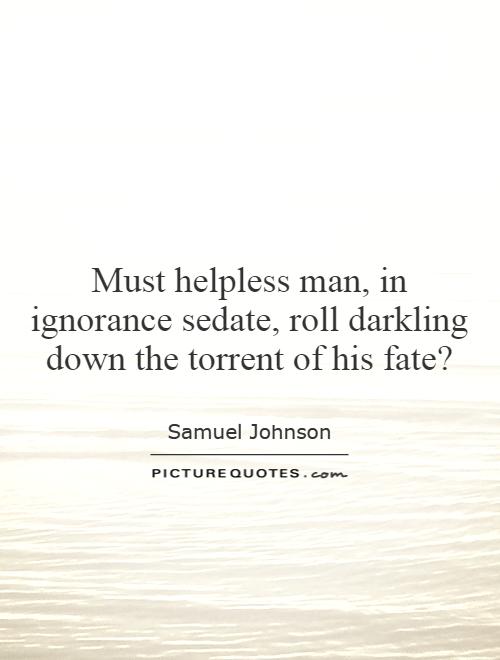Must helpless man, in ignorance sedate, roll darkling down the torrent of his fate?

Must helpless man, in ignorance sedate, roll darkling down the torrent of his fate?
The quote "Must helpless man, in ignorance sedate, roll darkling down the torrent of his fate?" is a thought-provoking line from Samuel Johnson's poem "The Vanity of Human Wishes." In this poem, Johnson reflects on the unpredictable and often harsh nature of life, questioning whether humans are truly in control of their destinies or simply at the mercy of fate.Johnson was a renowned English writer and critic of the 18th century, known for his wit, intelligence, and moral philosophy. In "The Vanity of Human Wishes," he explores the idea that despite our best efforts and intentions, we are ultimately powerless in the face of the forces that shape our lives. The image of a helpless man rolling down a dark and turbulent river symbolizes the idea of being swept away by the currents of fate, unable to steer our own course.
This theme of human helplessness and ignorance in the face of fate is a common motif in Johnson's work. He often grappled with questions of free will, determinism, and the limits of human knowledge. In "The Vanity of Human Wishes," he suggests that despite our best efforts to control our lives and shape our destinies, we are ultimately at the mercy of forces beyond our understanding.
Johnson's exploration of these themes reflects his deep concern for the human condition and his belief in the importance of moral and spiritual growth. He believed that by acknowledging our own limitations and embracing humility, we can find meaning and purpose in the face of life's uncertainties.












 Friendship Quotes
Friendship Quotes Love Quotes
Love Quotes Life Quotes
Life Quotes Funny Quotes
Funny Quotes Motivational Quotes
Motivational Quotes Inspirational Quotes
Inspirational Quotes